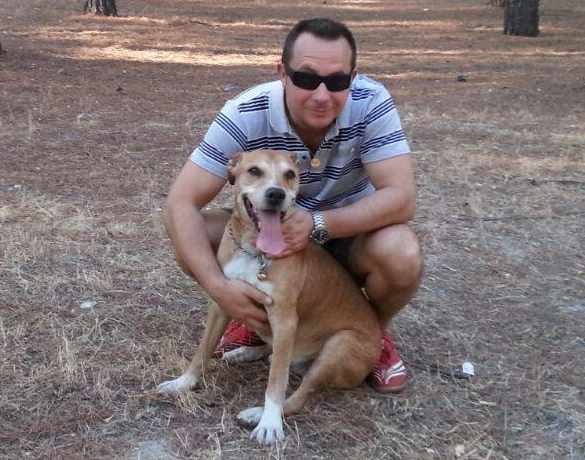Dogs and Ebola: The Heartbreak In The Death Of Excalibur
Despite protests and questions, the dog belonging to a nurse in Spain who contracted Ebola is killed.
By Vicki Croke
Update: October 13, 2014
Unlike the case in Spain, American dog whose owner contracted Ebola will be kept safe.

Nina Pham and Bentley. Photo: Pham family.
Dog lovers can relax this time around. Nina Pham, the Texas nurse recently infected with the Ebola virus has a dog, but the mayor of Dallas says the dog will not be killed. Bentley, her Cavalier King Charles spaniel, will be kept safe and eventually reunited with the owner, the mayor says.
That’s a very different scenario than we saw last week in Spain (see story below) when a dog named Excalibur, who belonged to a health care worker there who had contracted Ebola, was put to death out of fear he might spread the virus.
According to USA Today:
Mayor Mike Rawlings told USA Today that the dog remained in the health worker’s apartment when she was hospitalized and will soon be shipped to a new location to await its owner’s recovery.
There are no plans to euthanize the dog, he said.
“This was a new twist,” Rawlings said. “The dog’s very important to the patient and we want it to be safe.”
The group disinfecting the nurse’s home is working with an animal welfare organization and animal control to help the dog. At the moment, we know very little about the dog except that steps are being taken to keep the animal safe.
Bloomberg also reported:
“We just felt the dog is very important to this hero of a health-care giver and we’re going to do anything we can to help,” Rawlings said in an interview in Dallas. The dog will be moved from the house to a safe location and be cared for by the city, he said. “I believe the pet hasn’t caught anything.”
While there is no documented case of a dog transmitting Ebola to a human, dogs can carry the virus, scientists know, from a study done in Gabon a decade ago.
It is unclear if they can transmit the disease to humans.
Bloomberg reported:
Some of the Gabon dogs were observed eating fresh remains of Ebola-infected animals, and licking vomit from Ebola patients, according to a report published in CDC’s Emerging Infectious Diseases journal in 2005.
“Given the frequency of contact between humans and domestic dogs, canine Ebola infection must be considered as a potential risk factor for human infection and virus spread,” the researchers from the International Medical Research Centre of Franceville, Gabon, said. Human infection could occur through licking, biting, or grooming.
Dogs and Ebola: The Heartbreak In The Death Of Excalibur
By Vicki Croke
October 9, 2014
Yesterday, Excalibur, the dog belonging to Teresa Romero, the nurse in Spain who contracted Ebola, was euthanized. It’s painful for any pet owner to contemplate: Imagine that your beloved companion is killed by government order while you are quarantined in a hospital, fighting for your life.

The decision has caused outrage and heated debate.
The Independent in London reported:
Spain’s decision to euthanise the dog of a nurse who contracted Ebola has sparked a global outcry and clashes between police and animal rights activists after 390,000 people signed a petition urging to Government to save its life.
Officials from Madrid’s regional government obtained a court order on Tuesday to put down nurse Teresa Romero’s pet Excalibur, despite uncertainty over whether the dog was also infected or risked spreading the disease to humans.
It all started According to NPR’s Lauren Frayer when Romero helped treat two Spanish priests who had contracted Ebola in West Africa and had come back to Spain for care (they died in August and September). :
Laid low by a fever, Romero hung out with her dog in her apartment, in a southern suburb of Madrid, for about a week before checking herself into a hospital this past Monday. Her husband has been placed in isolation as well, as a precaution, though he has no Ebola symptoms.
When the government stepped in to disinfect the apartment, and began making plans to euthanize Excalibur, Romero’s husband, Javier Limon, quarantined in a Madrid hospital, sent out a heartbreaking video plea.

Javier Limon Romero with Excalibur.
The Independent reported:
He told activists: “I’m in the hospital and I’m making a call to all people to help me save my dog Excalibur because they want to kill him just like that, without following any procedure.”
There were protests outside Romero’s apartment in support of saving Excalibur and about 400,000 people signed a petition online. But despite that, Excalibur was euthanized.
While there was no clinical indication that Excalibur had Ebola, is it, in fact, possible for dogs to carry and spread the disease?
It’s complicated.
First of all, according to the Associated Press:
No case of Ebola spreading to people from dogs has ever been documented, but “clearly we want to look at all possibilities,” said Dr. Thomas Frieden, director of the U.S. Centers for Disease Control and Prevention.
No case of a dog spreading the disease to people has been documented, but a study suggests that it is possible.
CNN reported:
Studies on dogs transmitting the infection are not as conclusive. During the 2001-2002 Ebola outbreak in Gabon, scientists from the U.S. Centers for Disease Control and Prevention found signs of the virus in around 25% of dogs living in the affected area of the country. Yet none of the animals became symptomatic or died of the disease during the study period.
When other wild animals like chimpanzees are infected with the virus, “the infection is highly lethal and causes huge outbreaks and massive population declines,” the scientists wrote in their published paper.
Dogs may excrete infectious Ebola particles in their urine, feces or drool, the scientists wrote, as has been observed with other animals.
“Asymptomatically infected dogs could be a potential source of human Ebola outbreaks,” they wrote.
Meaning that even though the dogs did not exhibit signs of the disease, it’s possible they could transmit it.
Even if dogs can carry the virus, even if Excalibur himself did, do all scientists agree that should he have been euthanized?
Here is part of a question and answer article from the Associated Press:
A: No. The dog’s owners didn’t want it killed, and an animal rights group wanted it quarantined instead, although it’s not clear how effective that would have been since infected dogs don’t show symptoms, and it’s not known how long the virus can last in them.
Dr. Peter Cowen, a veterinarian at North Carolina State University who has advised global health experts on animal infection disease risks, thinks officials overreacted. “They should really study it instead,” he said.
Q: What about other dogs?
A: The risk that dogs might spread Ebola is very small in the U.S. or other places where dogs aren’t near corpses or eating infected animals, said Sharon Curtis Granskog, a spokeswoman for the American Veterinary Medical Association.

4 Responses to “Dogs and Ebola: The Heartbreak In The Death Of Excalibur”
I’m with Dr. Cowan: over-reaction and a missed — rare — opportunity to find out whether or not dogs can be infected. If Excalibur had transmitted ebola virus somehow, the damage is done and he would possibly be an ebola victim, too. And then euthanizing would be the humane thing, perhaps. Quarantine and study would have been far more humane, though, and potentially rewarding for science and medicine, not to say way less alarmist. Instead, a lost research opportunity and the pointless death of someone’s beloved dog just make me shake my head.
It is so inhuman to put an animal down like this without any reason.Spanish Government had no prove that Excalibur was infected.They should have knew it
properly and should have took Excalibur under proper testing like what they are doing with the other people whom they think are infected but when it comes to a dog no body
bothers.Very sad……
Hope she speaks out about the hasty, noncompulsory murder of her best friend by the craven Spanish govt. They’ve succeeded in discouraging others who suspect they may have the dread disease to ever come forward again. “Got ebola? We’ll kill your pets.” Idiots.
The Spanish government made a capricious, unscientific decision to kill the dog without any evidence that he was infected. The nurse who, in my opinion, is a heroine for working with Ebola patients, gets this for a “reward?” How disgusting!
Her recovery depends upon the physical and mental strength of her body. To sadden her by killing her beloved dog is criminal. How is she supposed to focus on recovering when the Spanish government has caused her to grieve the death of her dog. It’s simply criminal.
Comments are closed.